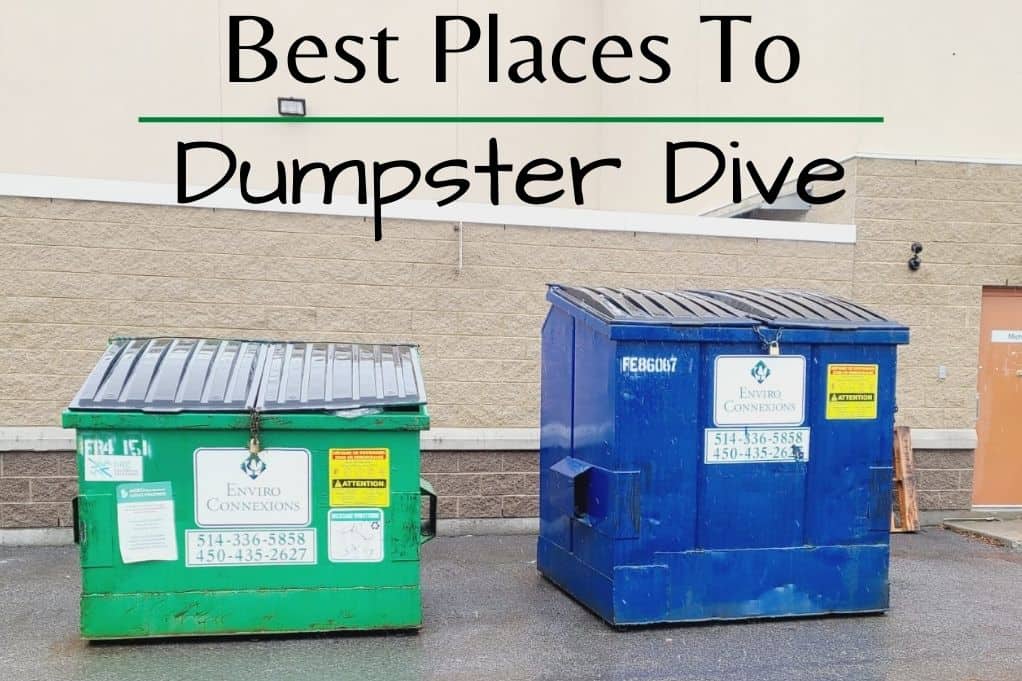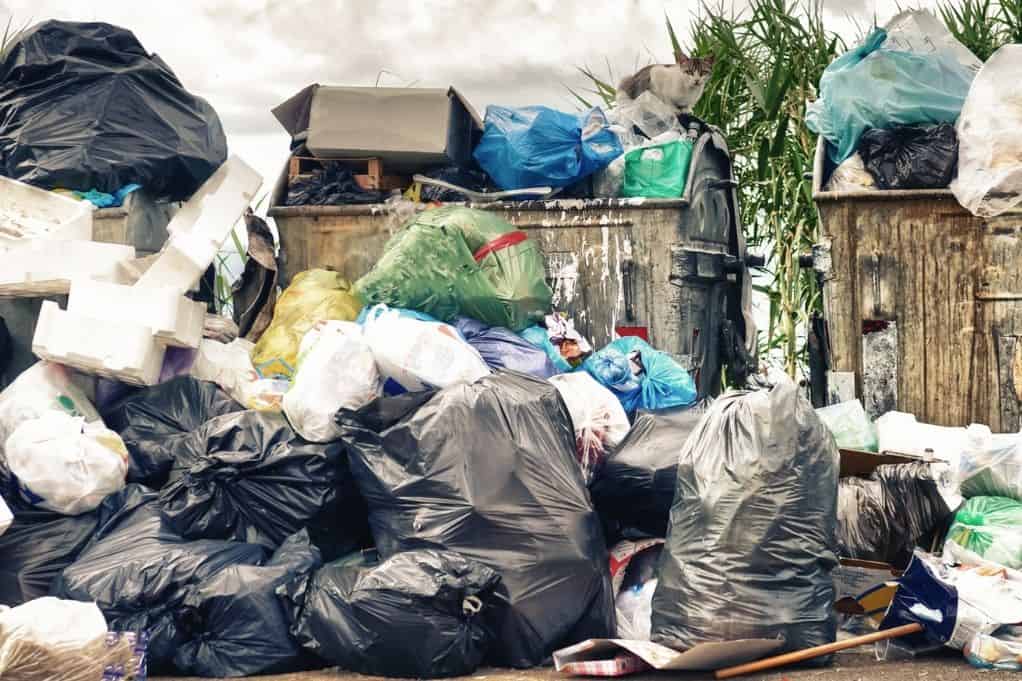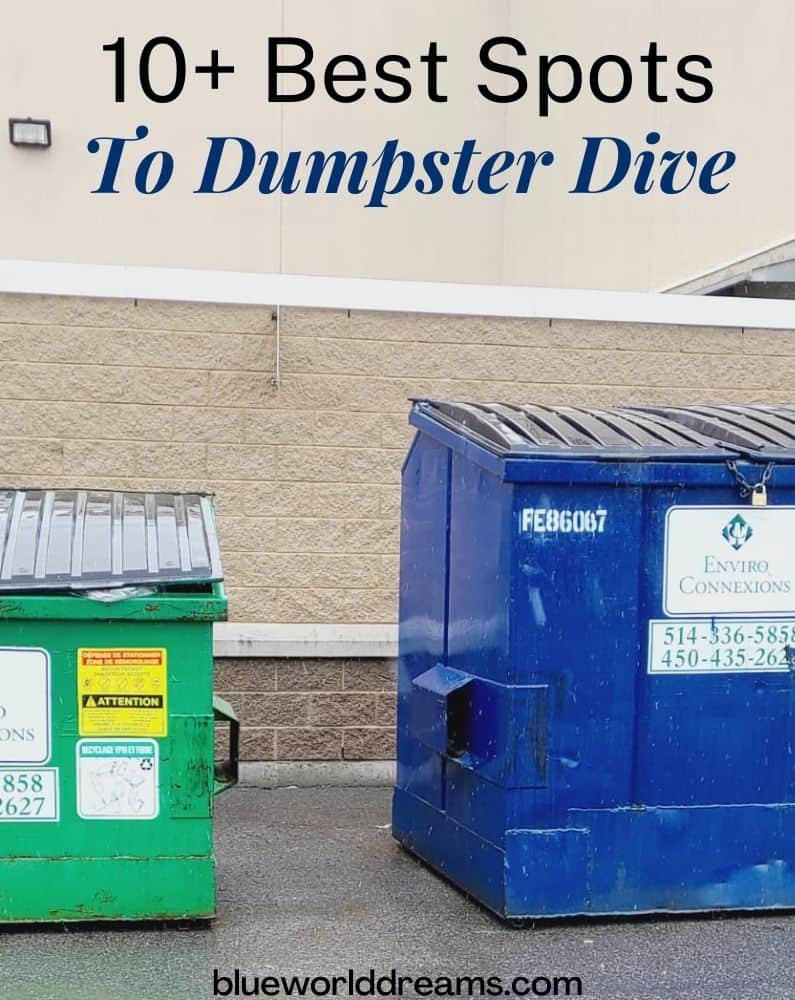12 Best Places To Dumpster Dive (Popular Spots)
What is dumpster diving? Have you heard about this unorthodox way to save money?
Dumpster diving comes down to retrieving discarded items from dumpsters.
Popular finds can be anything from food to clothes to electronics.
Some divers even make a living by sorting through piles of junk to find items they can sell or give away to people in need.
But where are the best places to dumpster dive? Let’s find out!

What are the best places to dumpster dive?
Depending on where you live, you can find dumpsters filled to the brim with various products, from food, clothes, books, and construction goods.
To reduce driving around for nothing, focus your search on places that may cater to your needs.
So, don’t hit up a Dollar Tree dumpster if you are looking for construction supplies and vice versa.
So, while dumpsters are all around, let’s look at some of the best places to dumpster dive:
1. Grocery stores
In the United States, roughly 40 percent of food is not eaten; this represents 108 billion pounds of wasted food.
Much of this food is still edible and could have been donated to organizations in need.
Unsurprisingly, grocery stores throw out a large portion of this wasted food; their dumpsters are often overflowing with food.
While some grocery stores will use a trash compactor, many rely on the standard dumpsters outside, making the food easy to salvage.
2. Bakeries
Who doesn’t love freshly baked pastries?
But given their short shelf life, most bakeries and coffee shops dump out their day-old donuts, bagels, and muffins at closing time.
However, while these items are often inside a clean garbage bag, it’s important to ensure no other trash has been placed inside the bag.
And don’t be shy to ask the workers or manager if they can hand you some freebies before they get dumped.
Our local Tim Hortons often hands out extra donuts and boxes of donuts in the last 30 minutes to customers making a small purchase.
3. Retail stores
Big box stores and even smaller retail stores are notorious for discarding merchandise.
Stores can throw out inventory for a variety of reasons:
- Seasonal items that no longer have a place on shelves
- Liquidation goods that remain unsold
- Overstock on items
- Returned items that cannot be placed back on shelves (food, underwear, cosmetics, feminine hygiene products)
- Broken or damaged items
- Recalled products
- The remaining few packages in a product line
You will often see dumpster divers on YouTube making the rounds at:
- Ulta
- Bath & Body Works
- Five Below
- T.J. Maxx
- Micheals
This can depend on your location, but generally, these five spots are considered some of the best stores to dumpster dive.
Ulta throws out plenty of returned cosmetics and beauty products.
Candles are the main find at Bath & Body Works. Micheals and T.J. Maxx dump plenty of seasonal goods and home decorations.
4. Pet stores
You can often find pet supplies at store dumpsters such as Pet Smart.
These items can include brand-new pet toys, bedding, leashes, soon-to-be expired food, and returned items.
But keep your eyes open as some divers have saved small live pets, such as birds and fish, that were returned to pet stores and were tossed out as trash.
5. Electronic stores
Like all retail stores, electronics stores like Best Buy and GameStop receive returns daily.
While some returns can go back onto shelves, other items are destined for liquidation pallets, and some end up in the trash.
Recycling electronics can be costly, leading some businesses to dump returned items that they cannot resell.
6. Apartment complexes
Apartment complexes can be a great spot to snag some fantastic items.
You benefit from sifting through dozens of people’s trash instead of driving around in your local community searching for individual finds.
You could technically come across all types of items people throw away at apartment complexes.
However, furniture, household goods, and old electronics tend to be the most common categories of objects discarded, especially during moving season.
Try checking the dumpsters before trash pick-up day to find the most items and when people are moving out at the start of each month.
Sundays are typically good when people are done with their weekend sorting.
7. Neighborhood homes
A little different from apartment complexes, you can opt to drive around residential areas looking for curbside treasures.
While you can try the day before trash pick-up, we recommend bulky trash day.
Many cities only collect larger items once per month.
Scouting the area the day before is the perfect opportunity to snatch up household items, furniture, and old appliances.
And if any “rich neighborhoods” exist in your area, these are often great spots to find higher-quality furniture pieces.
8. Colleges or Universities
College students are well-known for dumping goods at the end of each semester.
This makes college campuses a great place to find furniture, books, and other valuable items.
One thing I know from my days in college is that textbooks are costly.
These have great resell values, especially if you get them for free dumpster diving.
One of my small side hustles during school was finding cheap textbooks from thrift stores and reselling them, so imagine when they are free!
9. Construction sites
Have some upcoming renovations on the calendar? One of the best spots for dumpster diving is construction sites.
To be clear, construction sites often have pallets of tiles or bricks lying around, waiting to be installed; those are not for the taking.
But inside their large dumpsters, you can often find pieces of wood, leftover cabinetry, scrap metal, paint cans, and more.

10. Industrial areas
After over a decade of running a business in an industrial zone, I’ve seen plenty of objects thrown into dumpsters by neighboring businesses.
Depending on the companies and manufacturers in the area, you can find anything from fabric bolts to discarded lotion batches.
It’s also the perfect spot to find unwanted wooden pallets to resell or repurpose; many can be found dumped in corners.
However, dumpsters in these areas can sometimes be behind closed fences, so remember to respect enclosed spaces and not trespass.
11. Thrift stores
Don’t forget to check out the dumpsters behind your local thrift stores.
While thrift stores are meant to sell their items, they often receive too many donations to process.
Also, some thrift stores don’t have room for furniture and appliances.
Unfortunately, some people don’t check beforehand and still drop off oversized items on the curb or in the donation zones after hours.
Anything that cannot be sold or held in inventory has to be dumped for lack of space.
12. Florists
Florist shops are another business that relies on fresh products. When their flowers are past the point of looking fresh, they get discarded.
I put florist shops last on the list since flowers are more of a luxury than a necessity, and fewer people are hunting around for them.
Always make sure you are dealing with a dumpster and not a compactor. Never dumpster dive inside a garbage compactor, regardless of what you see inside.
Why do people dumpster-dive?
There are many reasons why someone would choose to dumpster dive, but here are the top 7 reasons:
1. Food insecurity
In 2020, over 38 million US households faced food insecurity.
Some people have opted to find resources in less conventional ways to meet their family’s needs.
Dumpster diving for food has become more common in recent years for lower-income households.
But it has also become more popular for those seeking financial relief wherever they can.
If you are diving for food, always check the expiration date and for any recalls on products.
2. Reduce waste
The US, unfortunately, tends to have a large amount of waste.
With forty percent of food waste, reducing that percentage is a primary concern for many environmental activists.
Some opt to salvage food and other goods and help reduce unnecessary waste.
3. Donations
Reducing waste often comes hand-in-hand with donations.
Many dumpster divers we see on YouTube or TikTok salvage goods for themselves and donate a large portion of their finds to food banks and shelters.
And some people dumpster-drive for the sole purpose of donating to people in need.
4. Frugality
Frugal living has become more prevalent in recent years, with many millennials opting to retire early by living a frugal lifestyle.
This stricter financial lifestyle can lead them to search for savings by using whatever they can salvage from their dumpster diving trips.
5. Side hustle
Another side to dumpster diving is profits.
Recovering goods to sell is a popular reason for dumpster diving.
Furniture can be cleaned and refinished or even repurposed. Metal can be sold to the nearest scrap yard near you.
New clothing or home goods can be sold on eBay or Facebook Marketplace for quick cash.
6. Recycling
Another reason for dumpster diving is recycling.
Not all businesses use recycling containers and discard anything unwanted as trash.
Some individuals try to do their part by removing items from the dumpsters that can be recycled versus ending up in a landfill.
Other people will recycle for profits where they can.
7. Artists
While this may not be the most popular reason for dumpster diving, more and more artists are using trash as their raw project materials.
These artists retrieve pieces of metal, wood, fabric, and plastic to create original and often impressive works of art.
This post contains affiliate links. We may earn a commission at no additional cost to you if you make a purchase through a link. Please review our disclosure for more information
Dumpster diving top items
You can find almost anything inside a dumpster on any given day, but here are some everyday items:
- Food
- Clothing
- Books
- Beauty and healthcare products
- Candles
- Furniture or small appliances
- Electronics (TVs, cables, printers, etc.)
- Decorations
- Baby gear
- Kids toys
- Tools
- Building materials
Best gear for dumpster diving
If you plan to start dumpster diving, there are a few items you should carry around for safety reasons, sanitation, and convenience.
Remember that these large trash containers contain everything from broken glass, sharp metal, mold, grease, vermin, and sometimes other visitors such as raccoons.
- Long sleeve clothing (shirt and pants)
- Closed-up shoes (safety shoes are best, but running shoes should do)
- Cut-resistant gloves
- Heavy-duty garbage bags or container
- Headlamp/flashlight
- Box cutter
- Trash picker/Grabber tool
- Dust mask (especially on construction sites)
- Glasses (optional)
- Wipes/hand sanitizer
- Crate/stepping stool for better access

Is dumpster diving illegal?
The question of legality is still a topic of debate.
There is some precedent with the 1988 court case of the Supreme Court case of California vs. Greenwood, making dumpster diving legal in all 50 states.
There are, however, there are many other considerations to keep in mind.
To legally dumpster dive, your activities must not interfere with state or county laws, city laws, businesses, or restaurant-specific laws.
Private property, fencing, locked dumpsters, or private property signage indicate that that area does not allow dumpster diving.
Some areas can be a little gray, such as the dumpster’s proximity to a building or store, so use your best judgment when evaluating if you are on private property.
For more information on the legalities of dumpster diving, you can read here.
If you are intent on dumpster diving, there are some essential rules not to ignore:
Do not trespass on private property: If you see a private property sign or decide to jump a fence, you should know this will be considered trespassing.
Do not litter: It can be more convenient to search through a dumpster as you empty out the bulky items; however, ignore the urge to do so.
If you were to get stopped by the cops, you could get slapped with a ticket for littering, regardless of whether you intended to clean up after you were done diving for goods.
Do not touch locked dumpsters: While this may seem obvious, a locked dumpster is hands-off; consider it a clear sign of private property.
Do not take barrels or rented items: Certain businesses like restaurants or manufacturing companies rent barrels for recyclables liquids they need to dispose of or sell.
Restaurants often resell their cooking oil to oil refineries. The oil itself is not garbage, and the barrels are likely a rental.
Consequences of being caught dumpster diving
The consequences of being caught dumpster diving will depend on the location and which laws get broken.
Sometimes, you may simply be questioned by law enforcement, and you can explain your way out of a citation.
If you are asked to leave the area, do so without arguing back.
In cases where the police are called, you can be cited for loitering, trespassing on private property, and even littering if you make a mess in the surrounding area.
Safety dumpster diving tips
Besides the laws mentioned above that you should follow, there are other tips to consider before heading out.
1. Don’t go out alone
We recommend always being 2+ people when dumpster diving, with one person always remaining on the outside of the dumpster.
2. Be cautious with the products you take
While finding free food, cosmetics, or other beauty products in trash bins can be exciting, you still need to be careful.
Food items can be recalled, so always check for recalls before consuming food found in a dumpster. Do not eat items with open packaging.
The same applies to other products used on your body or consumed.
You want to be cautious if applying used beauty products as they can be contaminated with bacteria or fungi.
Always wash clothing or fabrics and disinfect all items you bring home.
3. Wear appropriate gear
Wear appropriate clothing, gloves, glasses, and steel-toe shoes when diving in dumpsters.
You want to avoid hurting yourself with sharp objects, something heavy dropping on a foot, or mistakenly touching hazardous waste.
4. Avoid going out at night
While it can be tempting to go out dumpster diving under the cover of the night, it can also draw unwanted attention.
The best time to dumpster dive is during the day, as people are less likely to find your activities suspicious if you search in broad daylight.
You can stick to the early morning hours if you want to avoid bumping into workers just starting their shifts.
Going during daylight hours helps avoid accidental injuries as you can more easily sift through the junk, avoiding harmful objects.
Final thoughts on dumpster diving
Dumpster diving is a great way to find free items such as food, clothes, furniture, and electronics that would have otherwise ended up in a landfill.
You can choose to use these items for yourself, donate them, or sell them for cash.
Always wear protective gear to avoid any issues with sharp objects or hazardous materials.
And before heading out to some local dumpster, be sure to check state and local laws to ensure you don’t break any rules that could get you in trouble.
Other money articles
- Make cash selling to a scrap yard near me
- How to make money pallet flipping
- Highest paying plasma donation centers
- How to sell feet pictures for cash?
